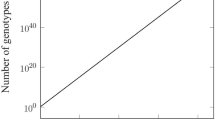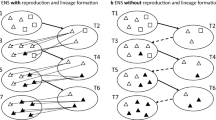Abstract:
We discuss a model of population dynamics under selection pressure from a changing environment. The population, subject to mutations, is composed of diploidal organisms reproducing quasi-sexually (two parents, recombination but no sexes) and with overlapping generations. Two cases are considered - in one we do not influence the dynamics of the population, while in the other we perform eugenics, i.e. we eliminate all individuals which have phenotypes not conforming to the optimal one at the place where the change has been made. We show that eugenics reduces greatly genetic diversity of the population, increases the percentage of homozygotes and therefore leads to a population badly prepared to cope with the next changes of the environment. The present paper is an extension of our previous work (Ref. [9]).
Similar content being viewed by others
Author information
Authors and Affiliations
Additional information
Received 16 May 2000
Rights and permissions
About this article
Cite this article
Pękalski, A. Effect of eugenics on the evolution of populations. Eur. Phys. J. B 17, 329–332 (2000). https://doi.org/10.1007/s100510070148
Issue Date:
DOI: https://doi.org/10.1007/s100510070148




